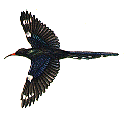
Dr Tom Flower
PhD (University of Cambridge, UK), MSc (University of Pretoria, SA), BSc Hons (University of Bristol, UK)
Birds & Environmental Change Partnership Programme, South African National Biodiversity Institute
Research interests
Tom’s principal research interest is in behavioural ecology, specifically why animals behave the way they do and how they acquire and produce their behaviour. Tom’s research has investigated deception, animal communication, cooperative breeding, kleptoparasitism, vocal mimicry, animal mutualisms and brood parasitism. Tom is additionally involved in research on behavioural flexibility in response to environmental change and the conservation of a critically endangered bird, the Raso Lark.
About Tom
Tom did his PhD at the University of Cambridge with Prof. Nick Davies investigating food theft and deception by an African bird, the fork-tailed drongo (2008-11). Prior to this, Tom was the manager of the Kalahari Meerkat Project and Kuruman River Reserve (2004-07), run by Prof. Tim Clutton-Brock (University of Cambridge) and Prof. Marta Manser (University of Zurich), which investigates the evolutionary causes and ecological consequences of cooperative breeding in meerkats (Suricata suricatta). While managing the meerkat project, Tom did his MSc research (2006-07) on the factors affecting competition for food in meerkats and more specifically, whether meerkats use competition for food as a means of suppressing their reproductive competitors. Tom has also worked on conservation of the critically endangered Raso Lark (2008-2011), whose entire population is confined to a single island in the Cape Verde’s off the west coast of Africa.
Tom joined the Fitz in January 2012 to begin a postdoctoral research fellowship investigating the strategies employed by animals in deceptive communication. In 2013 Tom was awarded a University Research Council Postdoctoral Fellowship to continue this research and further investigate how animals acquire and produce their deceptive behaviour.
Research
Deception
Tom uses a combination of observations and experiments to investigate the deceptive alarm calling behaviour of a habituated and colour ringed population of wild Fork-tailed Drongos (Dicrurus adsimilis) in the southern Kalahari Desert. This work is undertaken in collaboration with Dr Amanda Ridley (University of Western Australia). Tom’s previous PhD research showed that drongos steal food from other animals (kleptoparasitism) and commonly do so by producing false alarm calls, including mimicked alarms of other species, which cause targeted individuals to drop their food and flee to cover. But just as in Aesop’s fable ‘The boy who cried wolf’, other species cease responding to drongo alarm calls when false alarms are made too often. However, drongos can evade this problem by employing vocal mimicry to vary their false alarm calls and thus keep their deception racket going. This fascinating behaviour raises a number of important questions about animal communication and Tom is currently investigating:
(i) How deceptive signallers use feedback from their receivers behaviour to vary their communication strategies.
(ii) How drongos acquire the ability to produce deceptive alarm calls.
The Kuruman River Reserve also hosts the Pied Babbler Research Project run by Dr Ridley and the Kalahari Meerkat Project run by Prof. Tim Clutton-Brock and Prof. Marta Manser. It has therefore been possible to closely observe drongo interactions with the habituated populations of pied babblers(Turdoides bicolor) and meerkats (Suricata suricatta), studied by these projects which has greatly assisted drongo research.
Brood parasitism
In collaboration with Dr Claire Spottiswoode, Tom has initiated research investigating coevolution between the African Cuckoo and its host, the Fork-tailed Drongo. African Cuckoos lay their eggs in the nests of drongos and upon hatching, the cuckoo chick evicts the drongo’s own eggs and chicks from the nest, thereby monopolizing parental care for itself. Drongo eggs are highly variable in colour and pattern and evidence suggests that drongos reject cuckoo eggs dissimilar from their own. However, the cuckoo’s eggs are similarly variable and appear to mimic those of the drongos making rejection decisions difficult and potentially highly costly if a mistake is made. Dr Flower and Dr Spottiswoode are therefore investigating whether drongos in populations more frequently exposed to cuckoos are more likely to reject cuckoos eggs. This could have resulted in selection for new drongo egg pattern/colour morphs, resulting in greater egg variability in more exposed populations of drongos and comparable variation in the eggs of cuckoos that parasitize them. Additionally, Dr Flower and Dr Spottiswoode will exploit the wealth of knowledge on the life histories of drongos in Tom’s Kalahari population to investigate how age, sex and cuckoo parasitism experience affect egg rejection decisions by drongos.
Behaviour and Conservation
While at the Fitztitute Tom collaborated on several projects employing research on animal behaviour to inform conservation. With Dr Lorien Pichegru, Tom has investigated the behavioural flexibility of breeding African Penguins in response to human disturbance. With Dr Rowan Martin, Dr Susan Cunningham and Dr Ben Smit, he has investigated how environmental change, and specifically increasing temperatures, will affect bird population viability. Finally, with Davide Gaglio and Dr Timothée Cook, Tom is investigating how kleptoparasitism by Hartlaub’s Gull affects the breeding success of Swift Tern.
Graduated students
Davide Gaglio. 2017. Link between population dynamics, foraging behaviour and food abundance and distribution in the Swift Tern Thalasseus bergii PhD (Co-supervisors: Timothée Cook, Richard Sherley, Peter Ryan)
Ryan Olinger. 2016. How does temperature affect Fork-tailed Drongo Dicrurus adsimilis foraging effort, nestling provisioning and growth rates? MSc Conservation Biology (Co-supervisor: Susie Cunningham)
Bruce Baigrie. 2013. Mutualism benefits and the evolution of an interspecific sentry call in associations between Sociable Weavers and Fork-tailed Drongos. BSc Hons. (Co-supervisor: Peter Ryan).
Inge Adams 2014.Context-specific alarm mimicry by the Fork-tailed drongo. BSc Hons (Co-supervisor: Peter Ryan)
Recent peer-reviewed publications
2016
Townsend, S.W., Koski, S.E., Byrne, R.W., Slocombe, K.E., Bickel, B., Boeckle, M., Goncalves, I.B., Burkart, J.M., Flower, T.M., Gaunet, F., Glock, H.J., Gruber, T., Jansen, D.A.W.A.M., Liebal, K., Linke, A., Miklósi, Á., Moore, R., van Schaik, C.P., Stoll, S., Vail, A., Waller, B.M., Wild, M., Zuberbühler, K., and Manser, M.B. 2016. Exorcising Grice’s ghost: an empirical approach to studying intentional communication in animals. Biological Reviews. http://dx.doi.org/10.1111/brv.12289
2015
Flower, T.P., Ashton, B.J., Zöttl, E., Olinger, R.M., and Hockey, P.A.R. 2015. Dual parasitism of Fork-tailed Drongos by African and Jacobin Cuckoos. Ostrich 86: 189-191. http://dx.doi.org/10.2989/00306525.2015.1029032
2014
Baigrie, B.D., Thompson, A.M. & Flower, T.P. 2014. Interspecific signaling between mutualists: food-thieving drongos use a cooperative sentinel call to manipulate foraging partners. Proceedings of the Royal Society B 281(1791):20141232. http://dx.doi.org/10.1098/rspb.2014.1232.
Flower, T.P., Gribble, M. & Ridley, A.R. 2014. Deception by flexible alarm mimicry in an African Bird. Science, 344, 513-516. Doi: 10.1126/science.1249723
2013
Flower, T.P., Child, M.F. & Ridley, A.R. 2013. The ecological economics of kleptoparasitism: pay-offs from self-foraging versus kleptoparasitism. Journal of Animal Ecology 82:245-255.
2012
Brooke, M.de L., Flower, T.P., Campbell, E.M., Mainwaring, M.C., Davies, S. & Welbergen, J. A. 2012. Rainfall-related population growth and adult sex ratio change in the Critically Endangered Raso lark (Alauda razae). Animal Conservation doi:10.1111/j.14691795.2012.00535.x
Child, M. F., Flower, T.P. & Ridley, A.R. 2012. Investigating a link between bill morphology, foraging ecology and kleptoparasitic behaviour in the fork-tailed drongo Dicrurus adsimilis. Animal Behaviour, 84, 1013-1022.
Flower, T.P. & Gribble, M. 2012. Kleptoparasitism by attacks versus false alarm calls in fork-tailed drongos. Animal Behaviour 83:403-410.
Nielsen, J.F., English, S., Goodale-Copestake, W.P., Wang, J., Walling, C.A., Bateman, A. W., Flower, T.P., Sutcliffe, R.L., Samson, J., Thavarajah, N.K., Kruuk, L.E., Clutton-Brock, T.H. & Pemberrton, J.M. (in press). Inbreeding and inbreeding depression of early life traits in a cooperative mammal. Molecular Ecology. doi: 10.11.11/J.1365-294X.2012.05565.x
2011
Flower, T.P. 2011. Fork-tailed drongos use deceptive mimicked alarm calls to steal food. Proceedings of the Royal Society B-Biological Sciences. 278:1548-1555.
2010
Brooke, M.de L., Flower, T.P. & Mainwaring, M.C. 2010. Scarcity of females may constrain population growth of threatened bird species: case notes from the Critically Endangered Raso Lark Alauda razae. Bird Conservation International 20:382-384.
Clutton-Brock, T.H., Hodge, S.J., Flower, T.P., Spong, G.F. & Young, A.J. 2010. Adaptive Suppression of Subordinate Reproduction in Cooperative Mammals. The American Naturalist, 176:664-673. doi: 10.1086/656492

